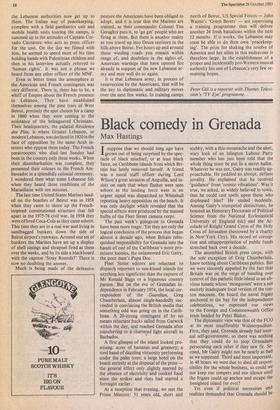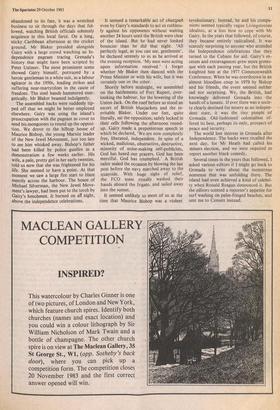Black comedy in Grenada
Max Hastings
suppose that we should long ago have grown out of being surprised by the spec- tacle of black mischief, or at least black farce, on Caribbean islands from which Bri- tain has lately removed herself. A friend was a naval staff officer during Lord Wilson's great invasion of Anguilla, and in- sists on oath that when flashes were seen ashore as the landing force went in an urgent signal was dispatched to Whitehall reporting heavy opposition on the beach. It was only daylight which revealed that the special effects were produced by the massed bulbs of the Fleet Street camera corps.
The past week's goings-on in Grenada have been more tragic. Yet they are only the logical conclusion of the process that began almost a decade ago, when Britain relin- quished responsibility for Grenada into the hands of one of the Caribbean's more pro- minent loonies, the unlamented Eric Gairy, the poor man's Papa Doc.
Fleet Street editors are reluctant to dispatch reporters to sun-kissed islands for anything less significant than the capture of Mr Ronald Biggs or a bigamous country parson. But on the eve of Grenadan in- dependence in February 1974, the local cor- respondent of the Guardian, Greg Chamberlain, almost single-handedly suc- ceeded in convincing the British media that something odd was going on in the Carib- bean. A 20-strong contingent of by no means reluctant hacks sailed from Gatwick within the day, and reached Grenada after transferring to a chartered light aircraft in Barbados.
A first glimpse of the island looked pro- mising: acres of bananas and greenery; a steel band of dazzling virtuosity performing under the palm trees; a large hotel on the beach entirely at the disposal of the press — the general effect only slightly marred by the absence of electricity and cooked food since the strikes and riots had started a fortnight earlier.
At a reception that evening, we met the Prime Minister: 51 years old, short and stubby, with a thin moustache and the alert, wary look of an Islington Labour Party member who has just been told that the whole thing must be put to a secret ballot. Whatever he was not, Gairy was readily ap- proachable. He peddled an abrupt, defiant jovality. He explained that he received 'guidance' from 'cosmic vibrations'. Was it true, we asked, as widely believed in town, that he could cast spells upon those who displeased him? He smiled modestly. Among Gairy's trumpeted distinctions, he boasted an Honorary Doctorate of Political Science from the National Ecclesiastical University of England (sic) and the Ac- colade of Knight Grand Cross of the Holy Cross of Jerusalem (bestowed by a charity in New York City). His record of corrup- tion and misappropriation of public funds stretched back over a decade.
The assembled British press corps, with the sole exception of Greg Chamberlain, knew nothing about Caribbean politics. But we were sincerely appalled by the fact that Britain was on the verge of handing over control of this pathetic little island to an ob- vious lunatic whose 'mongooses' were a not entirely inadequate local version of the ton- ton macoute. On board the naval frigate anchored in the bay for the independence celebrations, we expressed our views to the Foreign and Commonwealth Office team headed by Peter Blaker.
The diplomatic view was that of the FCO at its most insufferably Widmerpudlian. First, they said, Grenada already had inter- nal self-government, so there was nothing that they could do to stop Grenadans persecuting each other if they saw fit. Se- cond, Mr Gairy might not be nearly as bad as we supposed. Third and most important, in 48 hours we were due to shed all respon- sibility for the whole business, so could vv6 not keep our tempers and our silence until the frigate could up anchor and escape the benighted island for ever?
Yet even if political necessities and realities demanded that Grenada should be • abandoned to its fate, it was a wretched business to sit through the days that fol- lowed, watching British officials solemnly acquiesce in this local farce. On a long, sticky Caribbean afternoon at the cricket ground, Mr Blaker presided alongside Gairy with a large crowd watching an In- dependence pageant tracing Grenada's history that might have been scripted by Peter Ustinov. The most prominent scene showed Gairy himself, portrayed by a heroic gentleman in a white suit, as a labour agitator in the 1950s, leading strikes and suffering near-martyrdom in the cause of freedom. The steel bands hammered ener- getically. Mr Blaker beamed indulgently.
The assembled hacks were suddenly tip- ped off that we might be better employed elsewhere. Gairy was using the island's Preoccupation with the pageant as cover to send his mongooses to round up the opposi- tion. We drove to the hilltop house of Maurice Bishop, the young Marxist leader of the New Jewel Movement, just too late to see him whisked away. Bishop's father had been killed by police gunfire in a demonstration a few weeks earlier. His wife, a pale, pretty girl in her early twenties, told us now that she was frightened for his life. She seemed to have a point. At that moment we saw a large fire start to blaze merrily across the harbour. The house of Michael Silverman, the New Jewel Move- ment's lawyer, had been put to the torch by Gairy's henchmen. It burned on all night, above the independence celebrations. It seemed a remarkable act of chutzpah even by Gairy's standards to act so ruthless- ly against his opponents without waiting another 24 hours until the British were clear of the island. But he had never looked bouncier than he did that night. 'All perfectly legal, as you can see, gentlemen', he declared serenely to us as he arrived at the evening reception. 'My men were acting upon information received.' I forget whether Mr Blaker then danced with the Prime Minister or with his wife, but it was certainly one or the other.
Shortly before midnight, we assembled on the battlements of Fort Rupert, over- looking the habour, for the lowering of the Union Jack. On the roof before us stood an escort of British bluejackets and the in- evitable Blaker. Under our feet, quite literally, sat the opposition; safely locked in their cells following the afternoon round- up. Gairy made a preposterous speech in which he declared, 'We are now completely free, liberated, independent. In spite of a wicked, malicious, obstructive, destructive, minority of noise-making self-publicists, God has heard our prayers. God has been merciful. God has triumphed.' A British sailor sealed the occasion by blowing the last post before the navy marched away to the quayside. With huge sighs of relief, the FCO team ritually washed their hands aboard the frigate, and sailed away into the sunset.
It seemed unlikely to most of us at the time that Maurice Bishop was a violent revolutionary. Instead, he and his compa- nions seemed typically vague Livingstonian idealists, at a loss how to cope with Mr Gairy. In the years that followed, of course, they became entirely radicalised. It was scarcely surprising to anyone who attended the Independence celebrations that they turned to the Cubans for aid. Gairy's ex- cesses and extravagances grew more grotes- que with each passing year, but the British knighted him at the 1977 Commonwealth Conference. When he was overthrown in an almost bloodless coup in 1979 by Bishop and his friends, the event seemed neither sad nor surprising. We, the British, had knowingly delivered Grenada into the hands of a lunatic. If ever there was a socie- ty clearly destined for misery as an indepen- dent state, it was the tiny pimple of Grenada. Old-fashioned colonialism of- fered its best, perhaps its only, prospect of peace and security.
The world lost interest in Grenada after Independence. The hacks were recalled the next day, for Mr Heath had called his miners election, and we were required to report another black comedy.
Several times in the years that followed, I asked various editors if I might go back to Grenada to write about the monstrous nonsense that was unfolding there. The island had even achieved a kind of celebri- ty when Ronald Reagan denounced it. But the editors scented a reporter's appetite for surf washing on palm-fringed beaches, and sent mc to Consett instead.















































 Previous page
Previous page